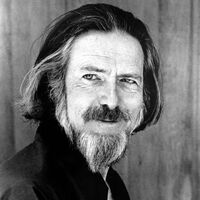If we get rid of all wishful thinking and dubious metaphysical speculations, we can hardly doubt that – at a time not too distant – each one of us will simply cease to be. It won’t be like going into darkness forever, for there will be neither darkness, nor time, nor sense of futility, nor anyone to feel anything about it. Try as best you can to imagine this, and keep at it. The universe will, supposedly, be going on as usual, but for each individual it will be as if it had never happened at all; and even that is saying too much, because there won’t be anyone for whom it never happened. Make this prospect as real as possible: the one total certainty. You will be as if you had never existed, which was, however, the way you were before you did exist – and not only you but everything else. Nevertheless, with such an improbable past, here we are. We begin from nothing and end in nothing. You can say that again. Think it over and over, trying to conceive the fact of coming to never having existed. After a while you will begin to feel rather weird, as if this very apparent something that you are is at the same time nothing at all. Indeed, you seem to be rather firmly and certainly grounded in nothingness, much as your sight seems to emerge from that total blankness behind your eyes. The weird feeling goes with the fact that you are being introduced to a new common sense, a new logic, in which you are beginning to realize the identity of ku and shiki, void and form. All of a sudden it will strike you that this nothingness is the most potent, magical, basic, and reliable thing you ever thought of, and that the reason you can’t form the slight idea of it is that it’s yourself. But not the self you thought you were.
